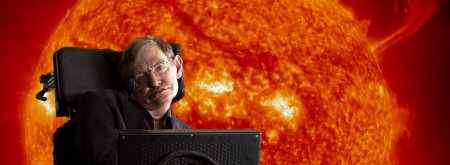Stephen Hawking and God
Even before its official publication on 9 September 2010, Stephen Hawking’s book The Grand Design (co-authored with Leonard Mlodinow, Bantam Press, 9 Sep 2010) received enormous newspaper, radio, TV and internet coverage for his claim that modern physics shows we do not require a Creator God. In what he describes as a “sequel” to A Brief History of Time in which he attempts “to answer the Ultimate Question of Life, the Universe and Everything”, he writes:
“Because there is a law such as gravity, the universe can and will create itself from nothing. Spontaneous creation is the reason there is something rather than nothing, why the universe exists, why we exist. It is not necessary to invoke God to light the blue touchpaper and set the universe going.”
In a letter to The Times on 4 September 2010 (page 23), Denis Alexander points out that the law of gravity is not “nothing” and so when Hawking seeks to explain why “there is something rather than nothing”, he is now using the word “nothing” with a rather different meaning. In Alexander’s words: “[Hawking] does not really mean ‘nothing’…. It is precisely the theist’s point that God is the ultimate source of all ‘somethings’, which certainly includes the laws of physics.”
The Daily Mail reported on Hawking’s claims on 3 September 2010, with a response by John Lennox entitled As a scientist I’m certain Stephen Hawking is wrong. You can’t explain the universe without God. As Lennox points out, there is nothing new in the claim, but by being linked with Stephen Hawking it has seen the media light, receiving the publicity that few other scientists can stimulate. Lennox rejects as false Hawking’s demand that we can choose only God or the laws of physics to explain the creation of the universe.
“…contrary to what Hawking claims, physical laws can never provide a complete explanation of the universe. Laws themselves do not create anything, they are merely a description of what happens under certain conditions. What Hawking appears to have done is to confuse law with agency.”
Lennox remarks that Newton’s Laws of Motion do not move snooker balls on the table: people – agents – are required to do that. As Lennox says: “…the laws of physics could never have actually built the universe. Some agency must have been involved.”
Hawking’s argument leaves further questions to be answered: where did “a law such as gravity” or any other scientific law come from in the first place? And Hawking’s own analogy of lighting the blue touchpaper leaves unanswered the origin of the touchpaper but also reveals the implicit belief we all have that to start off the universe something needed to be lit. In other words, in a void of nothingness, someone is still needed to set things off. Dr Rowan Williams, the Archbishop of Canterbury, commented that: “Physics on its own will not settle the question of why there is something rather than nothing.”
The Grand Design also discusses the idea of a Theory of Everything, an end point in development of scientific theories because it encompasses all of science. The best candidate for such a theory, Hawking argues, is M-Theory, with its prediction of the existence of a multiverse, the existence of many different universes, of which ours just happens to allow life. Other scientists have called this a “blind alley”, “highly speculative” and “not testable, not even in any foreseeable future”, relying on “a leap of faith”, according to The Times (4 September 2010, page 16). Roger Penrose in his review of the book in the Financial Times (which does not mention God once) remarks that "unlike quantum mechanics, M-theory enjoys no observational support whatever." New Scientist was impressed by the mathematical beauty and “awe” that M-theory generates, even if not so much by the scientific observations behind it. Its editorial (11 September 2010, p.5) concludes: “Until there is empirical evidence for M-theory, Hawking’s suggestion that it has all the answers is just a matter of faith.” Hawking and Mlodinow admit that in The Grand Design they are addressing questions that go beyond traditional science and stray into the field of philosophy. This was necessary, they boldly exclaim in chapter 1, because “philosophy is dead”.
Philosopher of physics, Craig Callender, seemed unconvinced by this claim in his review of The Grand Design in New Scientist (11 September 2010, p.50). As well as providing a (very) brief history of the development of string theory, Callender takes issue with Hawking's view that "science offers many incomplete windows onto a common reality", which he equates with the philosophical theory called "perspectivalism". This "model-dependent realism", as Hawking and Mlodinow call it, "bleeds into an alarming anti-realism: not only does science fail to provide a single description of reality, they say, there is no theory-independent reality at all."
In his Daily Mail article, John Lennox shows that arguments for the existence of God and the truth of Christianity are not tied exclusively to cosmological arguments. Having briefly covered some of the other arguments and evidence, Lennox concludes his article by saying: “Hawking’s new fusillade cannot shake the foundations of a faith that is based on evidence.”
Read chapter 1 of The Grand Design.
Links to Explore Further
John Lennox’s article in the Daily Mail:
Daily Mail: As a scientist I'm certain Stephen Hawking is wrong. You can't explain the universe without God
William Lane Craig's Audio Blog response:
William Lane Craig's 'Questions for Stephen Hawking'
Media coverage of Hawking’s new book:
Daily Mail: God did NOT create the Universe, says Stephen Hawking
Daily Telegraph: Stephen Hawking: God was not needed to create the Universe
Daily Telegraph: Has Stephen Hawking ended the God debate?
Daily Telegraph: Stephen Hawking: religious leaders dismiss 'God not needed' comments
Financial Times: Book review by Roger Penrose
The Guardian: Paul Davies on "Stephen Hawking's big bang gaps"
BBC Online News: Stephen Hawking: God did not create Universe
New Scientist editorial: Hawking's faith in M-theory
New Scientist book review: Craig Callender 'There is no theory of everything'



